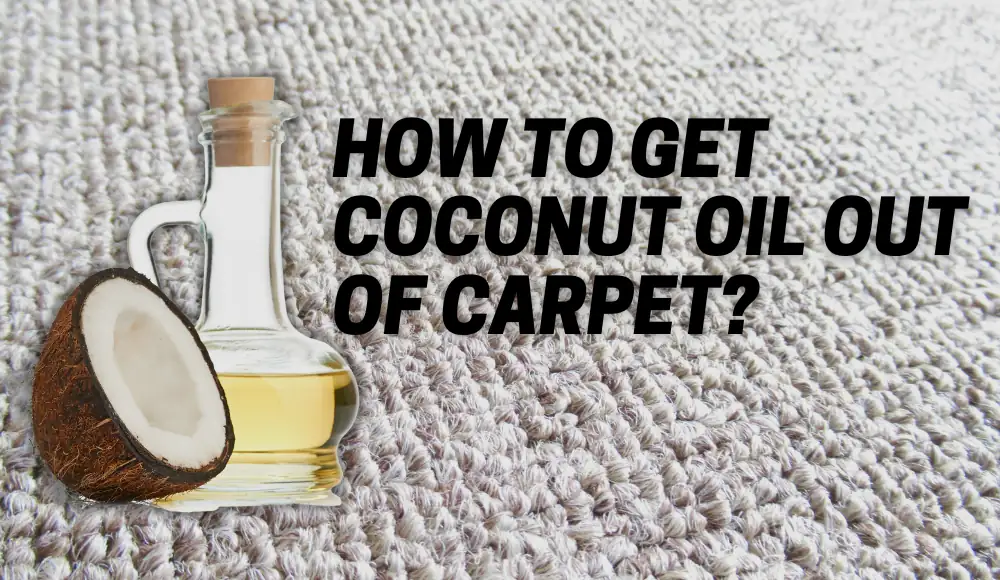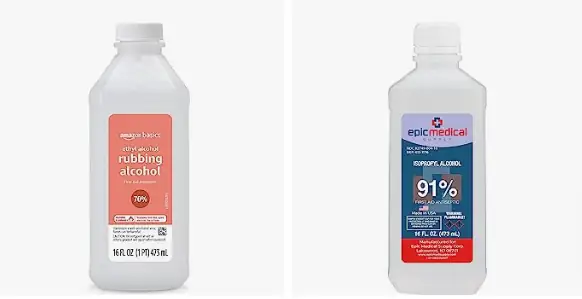Last updated on November 2nd, 2023 at 01:14 am
Coconut oil has gained immense popularity over the years, thanks to its numerous health benefits and versatility. From cooking to skincare, coconut oil has found its way into many aspects of our lives. However, despite its many advantages, dealing with coconut oil stains can be a real challenge, especially when it ends up on your carpet. In this blog post, we will explore why coconut oil is so hard to wash out, discuss effective methods for removing it from carpets, and provide useful tips and advice from real-life experiences.
So, if you’ve ever wondered how to get coconut oil out of your carpet, keep reading!
Understanding the Nature of Coconut Oil
Composition and Properties of Coconut Oil
Coconut oil, derived from the meat or kernel of mature coconuts, is a versatile and widely used natural product. It consists mainly of saturated fats, including lauric acid, which gives it its characteristic creamy texture and a pleasant aroma.
Lauric acid has antimicrobial properties that make coconut oil beneficial for the skin and hair.
Additionally, coconut oil contains vitamin E and antioxidants that promote overall health. When it comes to your carpet, however, the composition of coconut oil can present some challenges.
Unlike many other oils, coconut oil solidifies at temperatures below 76 degrees Fahrenheit (24 degrees Celsius). This means that when a spill occurs on your carpet, the liquid form will quickly solidify upon contact with the fibers.
As a result, coconut oil has a tendency to penetrate deep into the carpet strands rather than remaining on the surface like other oils would. This makes removal more difficult as it becomes embedded in the fibers.
Why is Coconut Oil So Hard to Wash Out?
Removing coconut oil from carpets can be quite tricky due to its unique composition and properties. The solidification aspect makes it adhere tightly to individual carpet fibers.
Moreover, since most carpets are made up of synthetic materials such as nylon or polyester, they tend to attract oils like magnets. As you may have experienced firsthand, trying to remove an oily substance from synthetic fibers can feel like an endless battle.
The stubborn nature of coconut oil means that traditional cleaning methods may not be effective in completely eradicating the stain and odor left behind after a spill incident.
It’s important to remember that immediate action is crucial when dealing with any spill on your carpet – especially one involving oily substances like coconut oil – as allowing it to sit or spread will only exacerbate the problem further.
Coconut oil is known for its high saturated fat content, which gives it a solid consistency at room temperature.
Unlike other oils that are liquid, coconut oil tends to solidify and cling to surfaces, making it challenging to remove. When it comes into contact with carpet fibers, it can penetrate deep within, making it even more stubborn to clean.
Additionally, coconut oil is hydrophobic, meaning it repels water, making traditional water-based cleaning methods ineffective.
Does Coconut Oil Stain Carpet?
Yes, coconut oil can leave behind unsightly stains on your carpet.
The oil can seep into the carpet fibers, causing discoloration and leaving a greasy residue. If not treated promptly, these stains can become more difficult to remove over time. It’s crucial to address coconut oil spills on your carpet as soon as possible to minimize the chances of permanent staining.
What Dissolves Coconut Oil?
To effectively remove coconut oil from your carpet, you need a substance that can break down the oil’s molecular structure.
One such substance is a solvent.
Solvents are capable of dissolving or dispersing substances that are typically insoluble in water, like oils. One commonly used solvent for this purpose is isopropyl alcohol.
Isopropyl alcohol, commonly known as rubbing alcohol, is a chemical compound with the molecular formula C3H8O. It is a colorless, flammable liquid with a strong odor. Isopropyl alcohol is widely used as a solvent and cleaning agent due to its ability to dissolve a wide range of substances, including oils, greases, and stains.
So it can help break down the coconut oil and make it easier to remove.
It’s important to note that before using any solvent on your carpet, you should test it on a small, inconspicuous area first to ensure it doesn’t cause any discoloration or damage.
What Gets Coconut Oil Out of Carpet?
Now that we understand the challenges of removing coconut oil from carpet, let’s explore some effective methods for getting it out:
How to clean coconut oil stains
- Act quickly: The key to minimizing the impact of a coconut oil spill is to act promptly. Blot the excess oil with a paper towel or clean cloth as soon as possible. Avoid rubbing, as it can spread the oil and make the stain worse.
- Use a solvent: As mentioned earlier, isopropyl alcohol can be an effective solvent for removing coconut oil stains. Apply a small amount of isopropyl alcohol to a clean cloth or sponge and gently dab the stained area. Continue blotting until the oil begins to lift from the carpet fibers. Be careful not to oversaturate the carpet, as excessive moisture can lead to other issues, such as mold growth.
- Try a carpet cleaner: If you don’t have isopropyl alcohol on hand, you can also try using a carpet cleaner specifically designed for removing oil-based stains. Follow the instructions on the cleaner and use a clean cloth or sponge to work it into the affected area. Afterward, blot the area with a clean, dry cloth to remove the excess cleaner and oil residue.
- Baking soda and vacuuming: Baking soda is known for its absorbent properties, making it an excellent option for soaking up excess oil. Sprinkle a generous amount of baking soda onto the stained area and let it sit for at least 30 minutes. The baking soda will help absorb the oil. Afterward, vacuum the area thoroughly to remove the baking soda and any remaining oil.
- Professional carpet cleaning: If the stain persists or covers a large area, it may be best to seek professional carpet cleaning services. Professional cleaners have the expertise and specialized equipment to tackle stubborn stains effectively. They can assess the situation and use appropriate techniques to restore your carpet to its former glory.
How to Get Coconut Oil Out of Carpet: Step-by-Step Guide
To summarize, here’s a step-by-step guide on how to get coconut oil out of your carpet:
- Act quickly and blot the excess oil with a paper towel or clean cloth.
- Test a solvent like isopropyl alcohol on a small, inconspicuous area of the carpet to ensure it doesn’t cause any damage or discoloration.
- Apply a small amount of isopropyl alcohol to a clean cloth or sponge and gently dab the stained area, working from the outside in.
- Continue blotting until the oil begins to lift from the carpet fibers.
- If isopropyl alcohol is not available, use a carpet cleaner designed for oil-based stains according to the instructions on the product.
- After applying the cleaner, blot the area with a clean, dry cloth to remove excess moisture and residue.
- For remaining oil or residue, sprinkle baking soda generously over the stain and let it sit for at least 30 minutes.
- Vacuum the area thoroughly to remove the baking soda and any remaining oil.
- If the stain persists or covers a large area, consider contacting professional carpet cleaning services for further assistance.
—
Does Vinegar Remove Coconut Oil?
While vinegar is often used as a natural cleaning agent, it may not be the best choice for removing coconut oil stains from carpet.
Vinegar is an acid, and using it on certain types of carpet can cause discoloration or damage. It’s advisable to avoid using vinegar unless you have confirmed it is safe for your specific carpet type.
How Long Does Baking Soda Take to Absorb Coconut Oil on Carpet?
Baking soda works by absorbing the oil from the carpet fibers, but the time required can vary depending on the amount of oil and the carpet’s thickness.
Generally, it’s recommended to leave the baking soda on the stained area for at least 30 minutes to allow it to absorb as much oil as possible. For more severe stains, you may leave it for a longer period, up to several hours.
Afterward, make sure to thoroughly vacuum the baking soda to remove the absorbed oil.
How to Get Coconut Oil Out of Carpet: Reddit Advice
Reddit can be a great resource for real-life experiences and advice. Here are a few tips from Reddit users on how to get coconut oil out of carpet:
| Tip |
|---|
| Let the oil dry and blot as much as possible. Use a hair dryer on warm to melt the oil, then blot with clean towels. Soak in cold water and white vinegar, then let it dry flat. |
| Place paper towels underneath and on top of the stain, then gently iron on the lowest setting. The oil should melt and be absorbed by the towels. |
| Tried to leech the oil out with heat and absorbent towels. Put the rug in the washer on high heat with extra rinse. Minimal damage and quick ironing. |
| Heat the rug and scrape the liquid out with a flat clamp or knife. Then use other tips for further cleaning. |
| Vinegar does not cut oils. Dry cleaning with strong solvents is recommended. |
| Try hot water and dish soap, which acts as a grease cutter. Apply dish soap directly to the oily surface without water for degreasing. |
| Scoop up any remaining oil with paper towels. Scrub with hot water and dish soap. A small amount of oil mixed with soap won’t harm the drain. |
| Pour boiling water down the sink to prevent oil from clogging the drain. |
Remember, each carpet and stain situation is unique, so adapt the methods and techniques to suit your specific needs and always prioritize the safety and integrity of your carpet.
Conclusion
Dealing with coconut oil stains on your carpet can be a challenging task. However, with the right approach and prompt action, you can successfully remove the oil and restore the cleanliness of your carpet.
Remember to act quickly, use suitable solvents or cleaners, and consider professional help if needed.
By following the steps and advice outlined in this article, you’ll be well-equipped to tackle coconut oil stains and keep your carpet looking fresh and clean.


